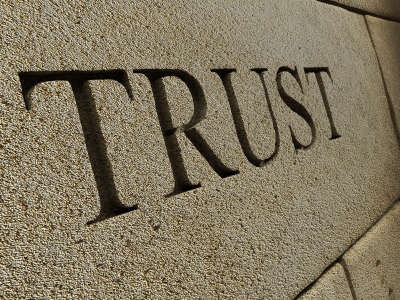Trust is one of the most important “muscles” you need to develop for sports success. All of your efforts related to conditioning, sport training, nutrition, and, of course, mental training is devoted to established a deep level of trust that you can perform your best and achieve your goals in your sport. Your goal is to establish and make deposits in your “trust fund” until you are so “rich” that you can go on a “spending spree” on the day of a competition.
So, what exactly is trust? I see it in several ways. Trust starts with a firm belief in your abilities and concludes with the belief on game day that your mind and body will do what it knows how to do, that is, perform its best. It also involves a basic perception that, if you give your best effort, good things will happen (usually in the form of a good performance and a satisfying result). Finally, trust enables you to view a competition with confidence, commitment, and courage, and without fear, doubt, or worry.
Trust is so important because, without it, you simply can’t perform your best. You won’t compete or take reasonable risks. You will perform cautiously and tentatively. With little or no trust, you will try to take control of your performances by thinking your way through the game; a recipe for athletic failure, to be sure. What trust provides you on the day of a competition is the ability to turn off your conscious mind and let your unconscious mind and your body take over, knowing that they will perform the way you trained them to.
A big problem with trust is that it takes a long time to develop and it can be lost in a second, often in reaction to a bad practice or competition. What can then result is a downward spiral in which a disappointing performance in training or a competition leads to a loss of trust which hurts motivation and confidence which, in turn, hurts your performances even more which reduces trust even more, etc. And when trust is lost completely at the end of this vicious cycle, it is a very long road back to regaining it.
Trust comes from several parts of your athletic life. It begins with your coach. If you don’t trust your coach to train you in a way that will enable you to achieve your goals, you won’t ever fully trust yourself. Your training program is also a key contributor to your sense of trust. You must truly believe that every aspects of your program will get you where you want to go including conditioning, sport training, nutrition, and mental training. Of course, you must also trust your equipment, if you compete in a sport that relies on gear such as tennis or golf. It also helps to be surrounded by people who believe in you; trust rubs off especially when you may lose trust in yourself after a bad day of practice or competition. The final piece of the trust puzzle is your preparations on game day. If you believe that you are as prepared as you can be when you enter the fray, you are going to have a high degree of trust that you can perform your best and achieve your game-day goals.
A key question to ask is: How do you build trust that will be resilient and unaffected by the normal ups and downs of practice and competitions? It starts with, as noted above, having a coach and training program you have faith in. Next, be sure that you give your fullest effort and are totally prepared in everything that impacts your sports participation. Then, allow your trust to build incrementally. Every effort, improvement, and success in every aspect of your sport should be “money in the bank” in which your trust fund steadily grows. You can begin to make deposits in your trust fund in situations without major consequences (e.g., conditioning, practice) and then progressively add to your trust fund in increasingly more demanding and important situations (e.g., game simulations, actual competitions). Lastly, because trust will take time to become ingrained, it’s essential that you make a conscious commitment to trust during your practice efforts and competitive preparations so trust slowly becomes your default state when you train and compete.
Finally, trusting yourself is risky because it doesn’t always turn out the way you want (this goes for sports as well as other aspects of life including new jobs and relationships). The only way to trust is to, well, trust. So, ultimately, to build your trust fund, you must take a leap of faith. What’s the leap of faith I’m asking you to take? That if you let go of conscious control and allow yourself to trust that you’ve done what’s necessary to perform your best and achieve your goals (when there are no guarantees that the trust will be rewarded), good things will happen. And the great thing is that the more you trust (while recognizing that good things don’t always happen), the easier it is to trust. So, instead of getting sucked into that vicious cycle of lost trust, you get lifted into an upward cycle of growing trust and better sports performance.
Want to build your “trust fund” through a structured mental training program? Take a look at my online mental training courses for athletes, coaches, and parents.






